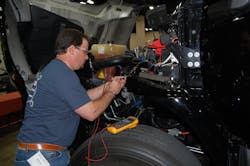As trucks continue to rely more and more electronic-based systems to operate – with computers controlling everything from the engine, transmission, emission control devices, even tire inflation – the skill requirements of the technicians in charge of maintaining and repairing commercial vehicles are being inexorably changed as well.
“You not only need an individual that understands the mechanics of the vehicles but also someone that is able to easily adapt to the ever changing technology that is being introduced by the OEMs,” Mark Lange, a maintenance services specialist with GE Capital Fleet Services, explained to Fleet Owner.
“Technicians must have basic computer skills to be able to navigate the technology and also be willing to periodically go take refresher training on not only the new technology but changes in current technology,” he added.
“The days of the ole shade tree are approaching an end [as] technicians are forced to be computer literate and most have to daily interface with some sort of electronic device daily to perform their jobs,” explains Allen Caldwell, manager of maintenance technology for trucking conglomerate First Fleet and chairman of the Technology & Maintenance Council’s S.12 Study Group.
“Technicians are now entering the realm of almost a surgeon or doctor. Although it may not require a college degree, the amount of training and the skills employed by technicians deems them special in their own right,” he explained. “If you can find a technician with an IT [information technology] or ‘geek’ background it is most certainly more of a win than a guy that can swing a clutch in four hours. We have guys that can fix any issue, but they have to be able to troubleshoot and find out the cause, or have techs on staff that can troubleshoot and defer to them for the repairs.”
The thorny issue facing the trucking industry where technicians are concerned, however, is finding them. In terms of raw numbers, the U.S. Bureau of Labor Statistics (BLS) indicates that the total population of truck, bus and diesel engine technicians is expected to expand from 242,200 back in 2010 to over 277,400 by 2020.
Yet that doesn’t tell the whole story, for while the agency noted those numbers indicate 35,200 new positions will open up in the technician ranks, the real job opening figure is 87,800, as BLS projects some 52,600 current techs are expected to retire – a massive draw down that’s poised to occur in just a scant seven years.
“The number of young people entering the profession continues to dwindle even as the demand for qualified diesel technicians skyrockets,” Andy Stopka, vice president of maintenance for NationaLease, noted in an interview with Fleet Owner earlier this year.
“In the past, a lot of our technicians came from the farm; they were kids used to working on equipment and ‘putzing’ around with their cars,” Stopka explained. “Today, we’ve lost a lot of those ‘putzers.’ I see the problem – I know what it is – but I just don’t know how to fix it.”
Yet some industry experts believe that the shift towards a more “computerized profile” for the truck technician job may actually in the long run serve to attract more potential candidates with the right skills sets to the profession.
“I actually believe the new workforce generation – Millenials and others – are already highly computer savvy,” noted Michael Riemer, vice president-products and channel marketing for Decisiv. “I believe this generation of technicians will embrace and almost demand this type of technology because it demonstrates a vision of the future and may actually help recruit technicians as the industry becomes more technology oriented.”
About the Author
Sean Kilcarr
Editor in Chief
Sean Kilcarr is a former longtime FleetOwner senior editor who wrote for the publication from 2000 to 2018. He served as editor-in-chief from 2017 to 2018.
